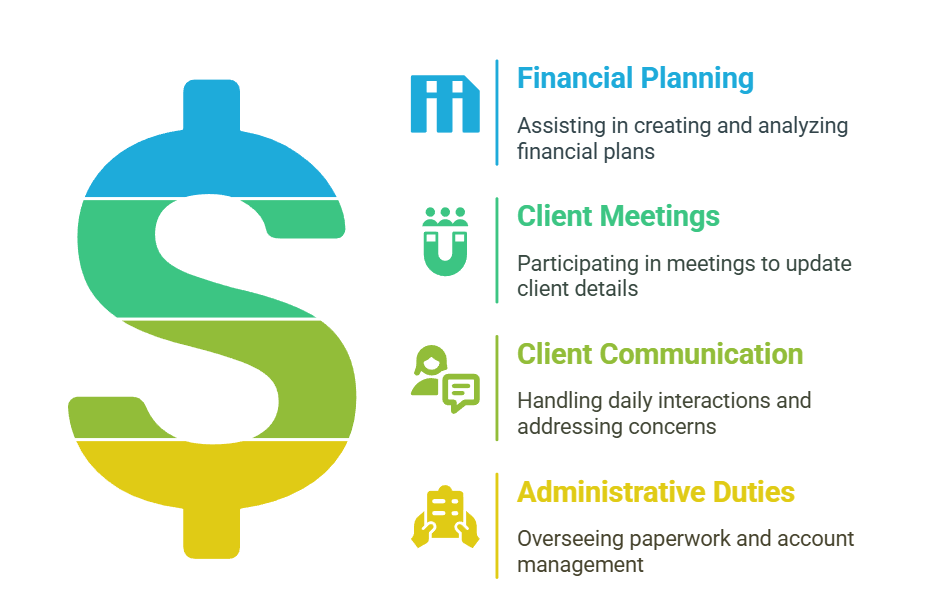
Why You Need an Associate Financial Advisor Today
Discover Associate Financial Advisor
If you’re juggling a busy schedule, navigating complex investments, or simply feeling unsure about your next financial move, an associate financial advisor could be exactly what you need. This professional works closely with a lead advisor, helping streamline wealth management strategies while also providing specialized support to keep your finances on track. By focusing on client relationships and administrative tasks, associate advisors free you to concentrate on what matters most—growing and protecting your assets.
In a market where personal financial advisors earn a median yearly pay of around $102,140 (according to the Bureau of Labor Statistics BLS), you’ll find that bringing on an associate financial advisor is not just an extra cost, but a strategic investment. They often cost less than a lead advisor’s fee, yet offer invaluable assistance you’ll appreciate for years to come.
Know Their Key Responsibilities

You might be asking, “What exactly does an associate financial advisor do?” In many firms, associate advisors:
- Assist in preparing client financial plans, running analyses, and checking assets.
- Participate in client meetings, making sure details like account balances, investment goals, and risk profiles are up to date.
- Handle day-to-day client communications, ensuring questions and concerns are addressed promptly.
- Supervise administrative duties, like paperwork for account openings or transfers.
As a high-net-worth individual, you likely value efficiency and personalized attention. An associate financial advisor helps your finance team fine-tune strategies without letting important details slip through the cracks. For more pointers on finding the right support, see our guide on how to choose a financial advisor.
Consider Compensation And Training
 | Wondering if an associate financial advisor is qualified enough to handle your needs? Rest assured, many associate advisors undergo intense training before and after they are hired. For instance, Morgan Stanley’s Financial Advisor Associate (FAA) Program includes a structured 36-month track focused on critical industry exams, such as the Series 7, 66, and the Securities Industry Essential (SIE) Exam (Morgan Stanley). During this period, new recruits dive into: Wealth management fundamentals and hands-on account management. Weekly coaching sessions with senior advisors on prospecting and relationship building. Specialized lessons on estate planning, investing, and tax laws. On the salary front, associate financial advisors typically earn a base, plus potential incentives for meeting performance goals. At Edward Jones, for example, associate advisors get competitive salaries, 401(k) benefits, bonus potential, and comprehensive health coverage (Edward Jones Careers). These benefits support their professional growth, so you can rest easy knowing they’re steadily sharpening their skills. |
Gain More From Your Advisor
| Having an associate financial advisor on your team bolsters your overall wealth strategy in ways you might not expect. Here’s how: 1. Deeper Expertise: With an extra set of hands to research and innovate, you get more robust recommendations. 2. Increased Client Care: Communication flows more smoothly as your associate advisor can answer routine queries, leaving complex tasks to the lead advisor. 3. Enhanced Longevity: As your associate advisor gains experience, they become a vital part of your long-term plan. This continuity helps if you ever seek additional support or if there’s a transition in your advisory firm. If you’d like to explore other options in the financial planning world, check out our page on financial advisory jobs to understand how different roles might suit your needs. |  |
Frequently Asked Questions
If you’re serious about finding an associate financial advisor, you might face questions like: “What is an associate financial advisor, why do I need one, how do I know they’re qualified, when should I bring them on board, and what licenses should they hold?”
Below, you’ll find quick answers:
- What is an associate financial advisor?
They are entry- or mid-level professionals who support lead advisors with planning, analysis, and client communication. - Why do I need one?
They offer hands-on help with your accounts and free up your time, so you can focus on strategic decisions rather than administrative tasks. - How do I know they’re qualified?
Look for Series 7, 66, or similar designations. Reputable training programs, such as those at Morgan Stanley or Edward Jones, also signal quality. - When should I bring them on board?
Consider adding an associate advisor when your portfolio becomes too large to manage alone or when you want extra support for major decisions. - What licenses should they hold?
Many associate advisors hold multiple FINRA (Financial Industry Regulatory Authority) licenses, such as Series 7, 66, and relevant state insurance licenses, ensuring they can legally advise on various investment products.
If you need more detailed guidance, you can explore who can I ask for financial advice to clarify what type of advisor best fits your situation.
In the end, teaming up with an associate financial advisor is about enhancing your financial well-being. You’ll benefit from specialized knowledge, consistent follow-up, and a smoother advisory experience. It’s a smart way to manage the complexities of your wealth today, so you can focus on enjoying the growth and stability you deserve tomorrow.
Recent Posts
Financial Advisors in Los Angeles to Consider
Finding the right financial advisor can be a pivotal step...
Financial Advisors in New York to Consider
Selecting the right financial advisors in New York can play...





